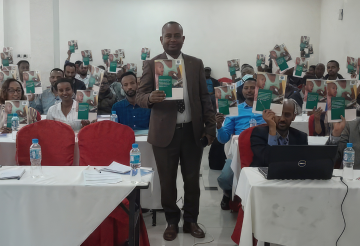Ethiopia marks another milestone in its pneumonia and diarrhoea reduction plans
13 June 2023
Earlier this month, an action plan to strengthen strategies for child survival, focused on the integrated management of childhood illnesses (IMNCI), was launched in Ethiopia, at an event attended by representatives from the regional health bureaus, health scientists from the Ethiopian Ministry of Health (MoH) and Malaria Consortium.
Ethiopia has made remarkable progress in improving child survival, reducing the mortality rate among children under five by 56 percent since 1990. Despite these efforts, under-five mortality remains high. Almost 80 percent of child deaths are attributed to neonatal causes, such as premature birth, childbirth-related complications and defects, and illnesses including diarrhoeal disease and pneumonia.
Alongside the MoH’s National Newborn and Child Development Strategy (2021-2025), the Ethiopian government is now collaborating with development partners including Malaria Consortium to improve child survival through the implementation of a national action plan that will address critical gaps and challenges in the health system, particularly as they relate to pneumonia and diarrhoea control.
“The low access and quality of pneumonia case management services (including diagnosis, appropriate treatment and referral) are among the main reasons why pneumonia remains the major killer in under-fives. The Ministry of Health’s commitment to strengthen interventions within facility- and community-based care, improve awareness of services among caregivers and promote positive, health-seeking behaviours to help prevent, assess and treat pneumonia and diarrhoea will improve equitable access to, and use of, pneumonia control services” commented Dr Zelalem Kefene, Project Coordinator at Malaria Consortium Ethiopia.
Over the past 10 years, Malaria Consortium has been at the forefront of pneumonia implementation research and researching the use of technology and innovations in social and behaviour change communication.
In 2022, Malaria Consortium and Ethiopia’s Maternal, Child Health and Nutrition directorate conducted a formative assessment of the implementation of IMNCI in Ethiopia, with a special emphasis on pneumonia case management and identified several factors that adversely affect service uptake and management of IMNCI at the community and health facility levels. This provided the foundation for the Federal Ministry of Health to create the national IMNCI action plan focusing on pneumonia and diarrhoea.
The Action Plan for Integrated Management of Childhood Illnesses takes a health system strengthening approach, modelled on the World Health Organization’s Health Systems Framework. It advocates for increasing equitable access to, and use of, high-impact pneumonia and diarrhoea interventions that are affordable and of high quality. The action plan also seeks to ensure the continuous availability of essential child health commodities, and to improve regular monitoring and evaluation of child health programmes.
Malaria Consortium has recommended five priorities for the Ethiopian MoH and its partners to strengthen the control and case management of these illnesses including improving equitable access to, and use of, pneumonia and diarrhoea control services and supporting operational research on priority areas.
To find out more, read the latest advocacy brief: Prioritising the pneumonia and diarrhoea agenda in Ethiopia: Strengthening strategies for child survival
Header image: Dr Zelalem Kefene, Project Coordinator at Malaria Consortium Ethiopia, holds a copy of the Action Plan at the dissemination event in June 2023
Related content
21 June 2022
Strengthening the pneumonia response in Ethiopia: Developing an action plan for the integrated management of newborn and childhood illnesses
8 June 2023Prioritising the pneumonia and diarrhoea agenda in Ethiopia: Strengthening strategies for child survival
Latest news
- Malaria Consortium honoured by Ugandan government for contribution to combat malaria23rd April 2024
- International summit calls for AMR accountability in public health interventions21st March 2024
- Global SMC community celebrates new milestone at SMC Alliance Annual Meeting in Nigeria6th March 2024
- Scaling up key interventions could halve pneumonia-related childhood mortality13th February 2024
- Malaria Consortium and eGov Foundation join Mozambique’s national malaria programme to digitalise seasonal malaria chemoprevention campaigns8th February 2024
- World’s first malaria vaccine rollout launched in Cameroon22nd January 2024